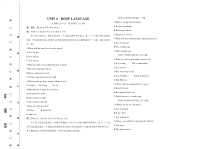 DOC
DOC
【文档说明】UNIT 4 BODY LANGUAGE.docx,共(12)页,71.116 KB,由小赞的店铺上传
转载请保留链接:https://www.doc5u.com/view-d1a6f8cc9add1554013030f11f78d165.html
以下为本文档部分文字说明:
姓名班级考号密○封○装○订○线密○封○装○订○线密封线内不要答题UNIT4BODYLANGUAGE全卷满分150分考试用时120分钟第一部分听力(共两节,满分30分)第一节(共5小题;每小题1.5分,满分7.5分)听下面5段对话。每段对话后有一个小题,从题中所给的A、B、C三个
选项中选出最佳选项。听完每段对话后,你都有10秒钟的时间来回答有关小题和阅读下一小题。每段对话仅读一遍。1.Whenwillthemanleavefortheairport?A.At2:30pm.B.
At4:30pm.C.At6:30pm.2.Whydoesthewomanthinkthemanislying?A.Hisbodylanguagetellsit.B.Heisadishonestperson.C.Shehasalreadyknownthetr
uth.3.Whatarethespeakersmainlytalkingabout?A.Ababy.B.Adog.C.Acat.4.Whatdidthewomandoyesterday?A.Sheplayedfootball.B.Shewatche
dagame.C.Sheworkedinthelab.5.Howdoesthemanfeel?A.Lucky.B.Surprised.C.Annoyed.第二节(共15小题;每小题1.5分,满分22.5分)听下面5段对话或独白。每段
对话或独白后有几个小题,从题中所给的A、B、C三个选项中选出最佳选项。听每段对话或独白前,你将有时间阅读各个小题,每小题5秒钟;听完后,各小题将给出5秒钟的作答时间。每段对话或独白读两遍。听第6段材料,
回答第6、7题。6.Whatiswrongwiththeman?A.Hehasaheadache.B.Hehasgottheflu.C.Hehasgotafever.7.Whendidtheproblembeginbotheringtheman?A.Twoweeksago.B
.Twomonthsago.C.Threemonthsago.听第7段材料,回答第8至10题。8.Whatdoesthewomanthinkofthebook?A.Itisboring.B.Itisstimulating.C.I
tisserious.9.Whowrotethebook?A.LoriGottlieb.B.AaronEsterson.C.ErikErikson.10.Whatwillthemanprobablydonext?A.Readthebook.B.R
ecommendthebook.C.Findsomeonetoconsultwith.听第8段材料,回答第11至13题。11.Wherearethetwospeakers?A.Inarestaurant.B.Inanoffice.C.Inaparkinglot.12.Whoseca
rwillthewomanputthestuffin?A.Theman's.B.Theman'ssister's.密○封○装○订○线密○封○装○订○线密封线内不要答题C.Herown.13.Whatisspecialabo
utthecar?A.Someslightscratchesareontheleftside.B.Ateddybearisinthefrontpassengerseat.C.Thecolourofthecarisredwhichisrare.听第9段材料,回答第14至17题。
14.WhatdoweknowaboutMaori?A.Theyrubeachother'snosesasagreeting.B.Theymakeagesturetosayhello.C.It'simpoliteforthemtogiveathumbs-upsign.15.Whatis
thewoman'snationality?A.Nigerian.B.British.C.Chinese.16.Howisthethumbs-upsignusedinBritain?A.Topraisesomeone.B.Toaskforaride.C.Toexpressanger
.17.Howdoesthemansuggestthewomanwriteherpaper?A.Bygivingmoredetailedinformation.B.Bywritingtheabstractfir
st.C.Bygivingasignificantconclusion.听第10段材料,回答第18至20题。18.Howdoesapersonfeelwhenheisinthefirststageofcultureshock?A.Everythingisnewanddifferent.B.Ev
eryoneiswatchinghim.C.Everythingchangesquickly.19.Inwhichstagedovisitorslaughattheirownfaults?A.Thesecond
stage.B.Thethirdstage.C.Thefourthstage.20.Whichstatementcanbestdescribethe“home”stage?A.Ireallyenjoylivingamongthepeoplehere.
B.Iwanttoliveahappylifeinthefuture.C.I'mgladtoreturntomyowncountry.第二部分阅读(共两节,满分50分)第一节(共15小题;每小题2.5分,满分37.5分)阅读下列短文,从每题所给的
A、B、C、D四个选项中选出最佳选项。AAteamofglobalbodylanguageexpertshascomeupwiththislistofthebestbodylanguagecourses.1.Bod
yLanguageforBusinessmenThiscourseisparticularlyusefultobusinessmen.Itwillteachyouhowtousebodylanguagetoincreaseyoursuccess,influence,a
ndincome.Bytheendofthecourse,youwillunderstandtheroleofbodylanguageinbusinesssuccessandgetacertificat
eofcompletionaftercompletingthecourse.2.BodyLanguageCourseThisbeginnerlevelcourseisusefultoanyoneeagertolearnhowtousebodylanguagetocommunica
teeffectively.Thecoursediscussestopicslikethesignificanceofcommunicationandtipsforimprovingbodylanguage.Thecourseis
deliveredbyaward-winninginstructors.3.DigitalBodyLanguageThiscourseteachesyouhowtoimproveyourdigitalpersonalbrand.Itdiscussesavari
etyoftopicslikethepoweroftheface,personalityandconfidence,drawingattention,andwebpageessentials.Bytheendofthecourse,youwillperfectonlinepresence,
masterdigitalbodylanguageandlevelupyourdigitalbrand.4.HowtoMakeaGreatFirstImpressionThiscoursewillmakeyourealizehoweyecontact,asmi
leandhandshakecanincreaseyourchancesofimprovingthefirstimpressionyoumakeontheotherperson,whichisquiteusefulfor姓名班级考号密○封○装○订○线密○封○装○订○线密封线内不要答题anyone
startinganewjob.Bytheendofthecourseyouwillpickuptheskillsandconfidenceyouneedtomakeagoodfirstimpression.21.Whichofthefollo
wingcoursesmaybestsuitaseniormanager?A.DigitalBodyLanguage.B.BodyLanguageCourse.C.BodyLanguageforBusinessmen.D.HowtoMakeaGreatFirstImpressi
on.22.WhatcanyoulearnifyoutakeDigitalBodyLanguage?A.Howtochangeyourcharacters.B.Howtoprotectyourselfonline.C.Howtobuildupasuccess
fulcompany.D.Howtoimprovepersonalinfluenceonline.23.WhoismorelikelytoattendHowtoMakeaGreatFirstImpression?A.Anewsre
porter.B.Ajobseeker.C.Alabresearcher.D.Aninterviewer.BAsayoungboy,Iknewwhatpeoplesaidwasnotalwayswhattheymeantor
werefeeling.AndIknewitwaspossibletogetotherstodowhatIwantedifIreadtheirrealfeelingsandrespondedsuitablytotheirneeds.Attheageofeleven,Is
oldspongerubberdoor-to-doorafterschoolandquicklyworkedouthowtotellifsomeonewaslikelytobuyfromme.WhenIknockedonadoor,ifsomeonetol
dmetogoawaybuttheirhandswereopenandtheyshowedtheirpalms,Iknewitwassafetocontinuewithmyshowbecausetheywere
n'tangryorthreateningalthoughtheymighthaveacoldattitude.Ifsomeonetoldmetogoawayinasoftvoicebutusedapointedfingerorclosedhand,Iknew
itwastimetoleave.Asateenager,Ibecameapotsandpanssalesperson,andmyabilitytoreadpeopleearnedmeenoughmoneytobuymyfirsthouse.Sellingga
vemethechancetomeetpeopleandstudythemcloseupandtoknowwhethertheywouldbuyornot,simplybywatchingtheirb
odylanguage.Ijoinedthelifeinsurance(保险)businessattheageoftwenty.AndIwentontobreakseveralsalesrecordsformycompany,becomingtheyoungestpe
rsontoselloveramilliondollars'worthofbusinessinmyfirstyear.Thisachievementallowedmetobecomeamemberofthewell-knownMillionDollarRo
undTable(MDRT).IwasluckythattheskillsI'dlearnedasaboyinwatchingbodylanguagewhilesellingpotsandpanscoul
dbeusedinthisnewarea,andweredirectlyrelatedtothesuccessIcouldhaveinanybusinesscloselyconnectedwithpeople.24.What
doestheauthorshareinParagraph1?A.Hispresentfeelings.B.Hispositivelifeattitude.C.Hislanguageability.D.Hise
arlierexperience.25.Whatdoestheunderlinedpart“thisnewarea”inthelastparagraphreferto?A.Thelifeinsurancebusiness.B.Thepotsandpansi
ndustry.C.Thestudyofbodylanguage.D.TheworkoftheMDRT.26.Whatisthekeytotheauthor'ssuccess?A.Listeningtocustomers.B.Arguingwithcustomers.C.Studyi
ngcustomers'words.D.Readingcustomers'bodylanguage.27.Howdoesthetextmainlydevelop?A.Byfollowingtheorderofspace.B.Byfollowingthe
orderoftime.C.Bygivingexamples.D.Bygivingreasons.C密○封○装○订○线密○封○装○订○线密封线内不要答题Whenwetalkmorebroadlyofbodylanguage,ratherthangoodpostures,wecanactual
lyseetheeffectsithasonrelationshipsrightthroughouttheanimalkingdom.Inparticular,bodylanguageisusedtoexpressp
owerthroughexpansivepostures.YoumightknowaboutAmyCuddy'sfamousTEDTalkandherincredibleinsightsintohowposturechangesourthoug
hts.Cuddyandherteamstudybodylanguage,particularlywhattheycall“high-power”and“low-power”poses.“High-power”poses
refertotheactoftakingapostureofconfidence,whichcanhelpyoufeelmoreself-confident,evenafteronlytwominutes.Typicalhigh-powerposesareaboutopeningup.Y
oustretchandexpandyourbodytotakeupasmuchspaceaspossible.Forexample,bossesaredoinghigh-powerposeswhentheyleanbackintheirchairs,puttheirha
ndsbehindtheirheads,andkicktheirfeetupontotheirdesks.Meanwhile,peopletakelow-powerpositionswhenthey'refeelinghelplessordefeated.T
heycloseup,armsaroundthemselves,takingupthesmallestspace.Someevenmorerecentstudiestookthisevenfurther:Ast
udybyresearchersfromColumbiaandHarvardUniversitiesshowedthatbodylanguagesymbolizingpowercanactuallyaffectourdecisi
on-making,unintentionally.Theresearchersmeasuredthedesireforriskofparticipantsineitherexpansive,powerfulposesorconstricted(收缩的)poses.Thosei
nthepowerfulposesnotonlyfeltmorepowerfulandincontrol,butwere45%morelikelytotakeriskyaction.“Thisisn'taboutwhatyourbodylanguageis
communicatingtoothers;it'saboutwhatyourbodylanguageiscommunicatingtoyou.Yourbodylanguageischangingyourmind,whichchangesyourbehaviorandwhichc
hangesyouroutcomes,”saidCuddy.Soifyouwanttotakeadvantageofthebenefitsoftheseposestoliveahealthierandhappierlife,whereshouldyoustart?28.Whichisprobab
lyalow-powerposeaccordingtothetext?A.Sittingwithhandscrossedinthelap.B.Armsraisedina“V”abovethehead.C.Standingwithyourlegsopen.D.Sittingwith
yourarmswideopenonthechair.29.Whatcanwesayaboutpeopleintheexpansiveposes?A.Theyarehesitant.B.Theyareveryshy.C.Theyfeeloutofcont
rol.D.Theyfeelmoreconfident.30.Whatisthebesttitleforthetext?A.ThepostureofconfidenceB.Cuddy'sresearchonbehaviorC.Thesurprisingpowerofbod
ylanguageD.Theresearchondecision-making31.Whatmightbetalkedaboutinthefollowingparagraph?A.Howtocorrectbadhabits.B.H
owtoimproveyourbodylanguage.C.Howpostureaffectsyourhealth.D.Whygoodposturematterstoemployees.DAccord
ingtoawell-knownteamofresearchers,therearethreekindsofsmiles:genuine,false,andmiserable.Howcanwedistinguishthem?Inex
perimentswheresubjectsareshownphotosoffakeandspontaneous(自发的)smiles,peopleareprettygoodattellingthedifference.Butintherealworld,mostpeoplearelessabl
etodistinguishbetweenthem.Theyaredistractedbyotherelementsofcommunicationsuchasspeech,handgestures,andotherbodymo
vements.However,iftheyweretofocusonlyontheface,theywouldprobablyknowwhetherasmilewasgenuineornot.Thisisbecausetwomusclesareinv
olvedinspontaneoussmiling.Thefirstmuscleisaring-likebandofmusclearoundeacheye.Whenitcontracts,itcauseswh
atweknowas“smiling姓名班级考号密○封○装○订○线密○封○装○订○线密封线内不要答题eyes”.Theothermuscleextendsfromthetopofthecheekbonetothecornersofthemouth.Itmovesthemouthup
wardswhenwesmile.Thismuscleonitsownproduceswhatwecallthe“mouthsmile”.Whenpeoplegenuinelysmile,inaspontaneousb
urstofpositiveemotions,thecornersofthemouthmoveupandthemusclesaroundtheeyesalsocontract.Itisthesemusclesthatshowthatasm
ileissincere.Smilescanmeanverydifferentthingsindifferentcountries.IntheUSA,forexample,asmileisafriendly,positivegestureoft
rust.Incontrast,insomeAsiansocieties,peoplesmilenotonlywhentheyarehappy,ofcourse,butalsowhentheyfeelanger,sadness,confusion
,orembarrassment,perhapstomasktheirtruefeelings.Culturalnormsaside,somepeopletendtosmilemorethanothersandthatseemstoindicatetheyareche
erful,optimistictypes.Butthatrelationshipisn'tstrictlytrue.Somepeoplerarelysmileandarequitehappy.Othersoftenhaveasmileontheirfacewhentheyareactu
allyfeelinganxious.Humancommunicationisfullofuncertaintiesandwesometimeshaveadifficulttimeunderstandingeachother,butagenuine,heartfeltsm
ilethatlightsupafacecanneverbemisunderstood.32.Whatdotheexperimentsshow?A.Mostpeopletendtoforceasmilewhent
akingpictures.B.Peoplewearingafakesmilecanbegenuinesometimes.C.Peopleusingbodylanguageoftensmilegenu
inely.D.Mostpeoplefailtodetectfakesmilesinrealityduetodistractions.33.WhatisParagraph2mainlyabout?A.
Howtocontrolfacialmuscles.B.Howsmilesinfluenceemotions.C.Howtodistinguishdifferentsmiles.D.Howspontaneoussmilinghappens.34.WhyaretheUSAandsomeAsianso
cietiesmentionedinthetext?A.Toshowtheproblemsbroughtbysmiling.B.Toshowsomeculturaldifferencesinsmiling.
C.Toexplainhowpeoplehidetheirtruefeelings.D.Toexplainwhysmilingmorecanhavepositiveeffects.35.Whatcanweinferfromthelastparagraph?A.Smilinghaslitt
letodowiththecharacter.B.Smilingcanclearupmisunderstandings.C.Peoplerarelysmilingarehardtogetonwith.D.Uncertainsmilescannotleadtocloserel
ationships.第二节(共5小题;每小题2.5分,满分12.5分)阅读下面短文,从短文后的选项中选出可以填入空白处的最佳选项。选项中有两项为多余选项。Whenyou'remeetingsomeon
eforthefirsttime,youwanttoleavehimorheragoodimpression.36However,it'snotjustyourmouthdoingthetalking
—thewayyouholdyourselfisjustasimportant.Herearesometipsonbodylanguagetoshowpositivityandkindnessincommunicationwithothers.Nodand
smilewhenappropriate.Thesenonverbalsignscanshowtheotherpersonthatyou'refullyinvolvedinwhatheorsheissaying,andinagreement.T
rynoddingthreetimestoshowthatyou'rereallyabsorbingwhatheorsheissaying.37Ifyouturnupthecornersofyourmouthbutyoureyesst
aythesame,youcouldcomeoffasinsincere.38Don'tbeobvious,buttrytomatchhisorherbodylanguageandfacialexpression.Bydoingthis,you'llhelptheothe
rpersonfeelcomfortable.Thismirroringtechniquehasevenbeenshowntoincreaseaperson'sgoodwilltowardthepersonmirroringhimorher.Ifheorsheisleaningonawall,
leanonthewall.Ifheorshehascrossedhisorherarms,crossyourarms.39Laughtruly.Evenifyou'reinaformalsetting,iftheotherpersonhasclearlysaidsomethingth
atwasintendedtoraisealaugh,laugh!40Andthiscanalsoshowhimorherthatyou'relisteningtowhatheorsheissaying.Avoidlaugh
ingoutofnervesorbecauseyouhavenothingtosay.密○封○装○订○线密○封○装○订○线密封线内不要答题A.Alwayskeepyourarmscrossed.B.Mirrort
hepersonyou'respeakingwith.C.It'saneasytechniquethatcanoftenpayoff.D.Showhimorherthatyouhaveasenseofhumor.E.Avoidtouchi
ngyourhairoradjustingyourclothing.F.Whenitcomestosmiling,makesureitreachesyoureyes!G.Youwanttosayallthepe
rfectthingsatalltherighttimes.36.37.38.39.40.第三部分语言运用(共两节,满分30分)第一节(共15小题;每小题1分,满分15分)阅读下面短文,从每题所给的A、B、C、D四个选项中选出可以填入空白处的最佳选项。Ivisi
tedmybestfriendSean,whosemom,CherylcouldonlycommunicatebyhergestureIcouldn'tunderstand.Ifelt41andfetchedanotepad(记事本)toexplaintoherthereasonformyvis
it.ThenIwenttoseeSeanseveraltimes.EachtimeIenteredherhouse,mymindwasfloodedwithguiltandanxiety.Ialwaysneededsomeoneto42tome,
butherdaughter-in-law,evenhergrandchildren,wouldn'ttakethetimetolearnsignlanguage.ThatnightIsawthatlookof43onherface.ThenexttimeIsawCheryl,Ididn'tget
thenotepadorletmyfriendSeanhelpme,butdecidedto44,whateveritwouldtake.Icouldsee45appearingonherfaceasIspelledouteachwordwithgesture.Iknewhowshefelt
knowingthatsomeone46enoughtolearntocommunicatewithher.WithinthreeweeksIhadlearned47AmericanSignLanguage(ASL).Onenight,everyonewassigning,whensudden
lyIcouldfollowthe48.Cherylslappedherhand,lookedmeintheeye,and49directlytome.SheknewmyheartandhowmuchIlo
vedherculture.Aboutamonthago,Cheryl,Sean,mydad,andItookatriptoCaliforniaStateUniversity,Northridge,whereIwouldstudy.Aswesatinthedeafstud
entadvisor'soffice,noone50butIunderstood.Heexplainedthe51Iwouldreceivetherewouldhelpmebecomeasignlanguageinterprete
randhowhe'dlikemetostartinanadvancedASLclass.Ilefttheuniversityandfeltso52.Somanypeopledon'tknowaboutdeafpeoplebecauseofthe
ir53tocommunicatewiththem.NowIcouldhelp.ThatnightCherylandIsatinourhotelroom;she54andsignedwithsmilingeyes
.Unlikethedaysinherlivingroomwithanotepad,I55andsignedback,“Iloveyou,too!”41.A.pleasedB.interestedC.relievedD.embarrassed42.A.leadB.pointC.explainD
.expose43.A.hopeB.approvalC.satisfactionD.loneliness44.A.leaveB.learnC.checkD.escape45.A.pleasureB.angerC.d
isappointmentD.sadness46.A.grewB.caredC.changedD.reserved47.A.advancedB.entireC.skillfulD.basic48.A.conversationB.beli
efC.instructionD.task49.A.signedB.admittedC.talkedD.apologized50.A.translatedB.repeatedC.interruptedD.occurred51.A
.permissionB.regulationC.educationD.suggestion52.A.shockedB.excitedC.upsetD.surprised53.A.willB.promiseC.turnD.inability
54.A.setoutB.workedoutC.reachedoutD.movedout55.A.finishedB.admittedC.understoodD.refused第二节(共10小题;每小题1.5分,满分15分)阅读下面短文,在空白处填入1个适当的单词或括号内单词的
正确形式。姓名班级考号密○封○装○订○线密○封○装○订○线密封线内不要答题While56(travel)inSweden,Icameacrossanincident,whichmademe57(embarrass).Oneday,IwaswalkinginthestreetwhenI
sawanadorablebabywhowassmilingatme,soItalkedtothemotherandkissedthebabyonthecheek.Tomysurprise,themotherstaredatmeforawhileandthenleft58(angry)
.WhenIreturnedtothehotel,Isetout59(learn)somethingaboutbodylanguage.Muchevidencerevealsthatifyouknowli
ttleaboutbodylanguage,youareunlikelytoenjoythe60(interact)withpeoplefromanothercountry.61weallknow,bodylanguage62(vary)fromculturetoculture.You
mustbewellawareofwhether63isappropriateforyoutodosomethingonsome64(occasion).Inaddition,you'dbetterpayattentiontohowanotherpersonreactstoyour
wordsorbodylanguage,sothatyoucanadjustyourself65theculturethere.56.57.58.59.60.61.62.63.64.65.第四部分写作(共两节,满
分40分)第一节(满分15分)假定你是李华,你校将举办英语演讲比赛。请你以“BodyLanguage”为题写一篇演讲稿,内容包括:1.肢体语言的重要性;2.你常用的肢体语言及原因。注意:1.词数80左右;2.结束语已为你写好,不计入总词数。BodyLanguageThat'sall.Th
anksforlistening.第二节(满分25分)阅读下面材料,根据其内容和所给段落开头语续写两段,使之构成一篇完整的短文。AlexwasveryexcitedbecauseNewYear'sEvewasapproaching.Suddenly,hesawhisgrandfath
ersittingalonelookingveryunhappy.Alexwenttohimandasked,“Grandpa,whyareyousittingalone?Isthereanythingwrongwithyou?”H
isgrandfatherreplied,“No,Iamfine.Ijustfeellikesittingalone.”“Grandpa,youknowtheNewYearisnear,soareyoupreparingforit?”askedAlexexcitedly
.“No,dear,Iamnot.Withthepassageoftime,theworldhascompletelychangedandIdon'tseethepointofcelebratingtheworldIseetoday,”answere
dhisgrandfatherdisappointedly.“Iknowsomethingiswrongwithyouandyouarenottellingme.Pleasetellmewhattheproblemis,”Alexsaid.“IfeelIamastrang
erintheworldIamlivingin.ItisnotthesameasIhaveknown.Noweveryoneisbusywiththeirownwork.Yourfatherisbusywit
hbusiness,yourbrotherisbusywiththecomputer,yoursisterisbusystudyingabroadandyourmumisbusywithhouseholdwork.Idon'tknowhowtopassmydays,”saidhisgra
ndfathersadly.密○封○装○订○线密○封○装○订○线密封线内不要答题“Grandpa,youhaveme!”saidAlex.Hisgrandfathersmiledandsaid,“Yeah,youarehere,butwhataboutothers?I
nourdays,wehadafixedtimeeachdaywhenthewholefamilysattogetherandtalked,sharedproblemsandlaughedtogether.”ThatnightAlexthoughtaboutwhathisgrandfa
therhadsaidandanideaflashedthroughhismind.HedecidedtohaveasurpriseNewYearpartyathisownhomeandmakeeveryonecometogetherthatday.AsNew
Year'sEvegotnearer,Alexgotbusypreparingfortheparty.Hekeptitasecretfromhisgrandfatherandaskedeveryonenottolethimknowaboutitinordertosur
prisehim.注意:续写词数应为150个左右。ItwasDecember31standeveryonewasbusywiththeirownwork.Alexsawhisgrandfatherlookingveryhappywhiletal
kingwiththefamilymembers.答案与分层梯度式解析UNIT4BODYLANGUAGE1.B2.A3.B4.C5.B6.A7.C8.B9.A10.A11.A12.B13.B14.A15.C16.B1
7.C18.A19.B20.A21.C22.D23.B24.D25.A26.D27.B28.A29.D30.C31.B32.D33.D34.B35.A36.G37.F38.B39.C40.D41.D42.C43.D44.B45
.A46.B47.D48.A49.A50.A51.C52.B53.D54.C55.C56.travel(l)ing57.embarrassed58.angrily59.tolearn60.interaction61.As62.varies63.it64.occasions65
.to第二部分阅读第一节A姓名班级考号密○封○装○订○线密○封○装○订○线密封线内不要答题◎语篇解读本文是一篇应用文,介绍了由一支全球肢体语言专家团队针对四种不同需求的人列出的最佳肢体语言课程。21.C细节理
解题。根据第二段第一句“Thiscourseisparticularlyusefultobusinessmen.”可知,该课程最适合高级经理。故选C。22.D细节理解题。根据第四段最后一句中的“youwillperfectonlinepresenc
e,masterdigitalbodylanguageandlevelupyourdigitalbrand”可知,DigitalBodyLanguage课程可以帮你提升网上形象,精通数字化肢体语言,所以D项“如何提高个人网上影响力”符
合题意。故选D。23.B推理判断题。根据最后一段第一句中的“whichisquiteusefulforanyonestartinganewjob”可知,HowtoMakeaGreatFirstImpression课程对那些开始一份新工作的人相当有用。故推知,更有可能参加该课程的
是求职者。故选B。B◎语篇解读本文是一篇记叙文。作者从小卖东西,学会了理解人们的肢体语言,这给他以后事业的成功带来了关键性的帮助。24.D推理判断题。作者在第一段描述了自己小时候推销物品的经历,从中他学会了判断他人的肢体语言的含义,这为他后来的成功打下了基础,所以作者在第一段分享自己的早期工作经历
,以凸显其对他以后事业成功的作用。故选D。25.A词义猜测题。根据最后一段中画线部分所在句并结合该段第一句“Ijoinedthelifeinsurancebusinessattheageoftwenty.”可推知,作者小时候在销售锅碗
瓢盆的时候学会的看肢体语言的技巧可以用在“人寿保险业务”这个新的领域,这些技巧直接关系到在任何与人密切相关的生意上的成功。故画线部分thisnewarea指的是“人寿保险业务”。故选A。26.D细节理解题。根据最后一段最后一句可知,作者成功的关键是能够理解客户的肢体语言。故选D。2
7.B推理判断题。根据第一段的“Asayoungboy,Iknew...”“Attheageofeleven,Isold...”、第二段的“Asateenager,Ibecame...”和最后一段的“Ijoinedthelifeinsurancebusinessattheageoftwenty.”
可知,本文是按照时间发展的顺序进行叙述的。故选B。C◎语篇解读本文是一篇说明文。研究发现,高权力姿势能够提高自信心,使人更容易冒险,进而影响个人决策。28.A推理判断题。根据第三段最后两句提到的“与此同时,当人们感到无助或泄气时,他们会采取低权
力姿势。他们合拢身体,双臂抱着身体,占据最小的空间”可推断,A项“手交叉放在腿上坐着”可以缩小自己占据的空间,属于“低权力”姿势。故选A。29.D细节理解题。根据第三段第一句提到的“‘高权力’姿势指的是摆出一种自信的姿势,这种姿势即使在仅仅两分钟后也能帮助你感觉更自信”以及第四段最后一句提到
的“那些摆出强势姿势的人不仅感觉自己更强大、更安然,而且采取冒险行动的可能性也高出45%”可知,摆出扩张式姿势的人通常会感觉更加自信。故选D。30.C主旨大意题。文章介绍了Cuddy和她的团队将肢体语言分为“高权力”姿势和“低权力”姿势,并列举了“高权力
”姿势和“低权力”姿势的不同表现。哥伦比亚大学和哈佛大学的研究人员发现,象征权力的肢体语言能够使人更容易冒险,影响人的决策,所以C项“肢体语言的惊人力量”能够概括本文主旨。故选C。31.B推理判断题。最后一段作者提出“如果想利用这些姿
势的好处过上更健康、更快乐的生活,你应该从哪里开始呢?”的问题,所以接下来文章可能会讨论应该从哪些方面入手来改善肢体语言。故选B。D◎语篇解读本文是一篇说明文,主要说明了大多数人在现实中无法辨别虚假的微笑和自然的微笑,自然而然的微
笑是如何发生的以及微笑在不同的国家有不同的含义。密○封○装○订○线密○封○装○订○线密封线内不要答题32.D细节理解题。根据第一段第三、四、五句内容可知,实验说明了由于分心,大多数人在现实中无法辨别虚假的微笑和
自然的微笑。故选D。33.D主旨大意题。第二段从肌肉收缩与舒张的角度解释了自然的微笑产生的过程。故选D。34.B推理判断题。倒数第二段第一句“Smilescanmeanverydifferentthingsindifferentcountr
ies.”点明微笑在不同的国家有不同的含义。接下来作者以美国人和一些亚洲人的微笑举例,显然是为了展示与微笑相关的文化差异。故选B。35.A推理判断题。根据最后一段的信息“抛开文化规范不谈,有些人比其他人更爱笑,这似乎表明他们是开朗、乐观的类型。但
这种关系并不完全正确。有些人很少微笑,却很快乐。另一些人通常在他们真正感到焦虑的时候脸上挂着微笑。人类的交流充满了不确定性,有时我们很难理解彼此,但一个真诚的、发自内心的、让人面露喜色的微笑永远不会被误解”可推知,微笑与性格没什么关系。故选A。第二节◎语篇解读本文是一篇说明文。文章主要介绍了一些有
关肢体语言的技巧,这些技巧可以在与他人交流时表现出积极和友善。36.G设空处上一句提到“当你第一次见到某人时,你想给他或她留下好印象”,设空处下一句提到“然而,不仅仅是你的嘴在说话,你保持的姿态也同样重要”,G项“你想在所有适当的时间说所有完美的话”
符合上下文语境,这是我们认为的留下好印象的做法,同时,下文也是对这种做法的一种补充说明。故选G。37.F设空处下一句提到“如果你嘴角上扬,但眼睛没动,你可能给人不真诚的印象”,F项“当提到微笑时,一定要让它触及你的眼睛!”是在介绍微笑时正确的做法。故选F
。38.B根据下文,尤其是“Thismirroringtechniquehasevenbeenshowntoincreaseaperson'sgoodwilltowardthepersonmirroringhimorher.”可知,这种镜像
技巧甚至可以增加一个人对与他或她相似的人的好感,B项“同与你交谈的人(在肢体语言方面)保持一致”是对整段内容的概括,符合语境。故选B。39.C上文提到的是镜像技巧,C项“这是一种很简单的技巧,往往很有效”是对上文提到
的镜像技巧的评价,符合语境。故选C。40.D设空处上一句提到“即使是在一个正式的场合,如果对方明确地说了一些想引起笑声的话,那就笑吧!”,D项“向他或她展示你有幽默感”承接上文内容,说明笑了之后会展示你是有幽默感的。故选D。第三部分语言运用第一节◎语篇解读本文是一篇记叙文。作者去看望好朋
友Sean,发现自己不能理解Sean的妈妈——Cheryl的手语,同时作者也看出了Cheryl内心的孤独。后来作者下决心去学习手语,希望能帮助更多耳聋的人。41.D根据上文的“Cherylcouldonlycommunic
atebyhergestureIcouldn'tunderstand”并结合下文作者学习手语后两人的默契交流可推知,当时作者不懂朋友妈妈——Cheryl的手语,所以感到尴尬。A.高兴的;B.感兴趣的;C.感到宽慰的;D.尴
尬的。故选D。42.C从上文“CherylcouldonlycommunicatebyhergestureIcouldn'tunderstand”可推知,作者不懂手语,所以需要有人给她解释。A.带领;B.指;C.解释;D.暴露。故选C。43.D由第二段最后
一句中的“herdaughter-in-law,evenhergrandchildren,wouldn'ttakethetimetolearnsignlanguage”可知,她的家人有的没有学习手语,所以他们不懂她的手语,无法与她交流。故推知,她感到孤独。A.希望
;B.赞成;C.满足;D.孤独。故选D。44.B由空前的“Ididn'tgetthenotepadorletmyfriendSeanhelpme”并结合第五段第一句中的“WithinthreeweeksIhadlearned”可推知,作者没有使用记事本或者让Sean帮助交流,而是
决定学习手语。A.离开;B.学习;C.检查;D.逃避。故选B。45.A由空后的“asIspelledouteachwordwithgesture”并结合上文提到的她的家人有的不理解她的手语,她感到孤独可推知,有人能和她交流了,她应该感到欣慰。A.欣慰;B
.愤怒;C.失望;D.悲伤。故选A。姓名班级考号密○封○装○订○线密○封○装○订○线密封线内不要答题46.B上文谈到Cheryl的家人有的没有学习手语,她感到孤独,根据空后的“enoughtolearntocommunicat
ewithher”可知,作者学手语是因为足够关心Cheryl的感受。A.成长;B.关心,在意;C.改变;D.保留。故选B。47.D根据空前的“Withinthreeweeks”并结合手语的特点可推知,在如此短的时间里作者学习的应该是“基
本的”手语表达。A.高级的;B.整个的;C.有技巧的;D.基本的。故选D。48.A由空前的“everyonewassigning...”和空后的“Cherylslappedherhand,lookedmeintheeye”可推知,作者能够使用手语与Cheryl交流了,耳聋的人的手势,即“sign”
就是他们的会话。A.会话,交谈;B.信念;C.指导;D.任务。故选A。49.A由上文叙述的作者能够与Cheryl交流了可推知,她对我“打手势”符合逻辑。A.打手势;B.承认;C.谈论;D.道歉。故选A。50.A根据“Aswesatinthedeafst
udentadvisor'soffice,noone50butIunderstood.”,尤其是句中的but可知,设空处前后是转折关系,结合选项可知,这里想要表达的是虽然没有人翻译,但作者理解聋生顾问的话。A.翻译;B.
重复;C.插嘴;D.发生。故选A。51.C根据上文的“CaliforniaStateUniversity,Northridge,whereIwouldstudy”可推知,作者是去学习的,所以这里指要接受的教育。A.许可;B
.规则;C.教育;D.建议。故选C。52.B根据下文的“NowIcouldhelp.”可推知,作者自己可以帮助那些失聪的人,所以感到很兴奋。A.震惊的;B.兴奋的;C.沮丧的;D.惊讶的。故选B。53.D根据常识可知,很多
人不了解失聪者是因为他们无法和失聪者进行交流。A.意愿;B.承诺;C.转动;D.不能,无能。故选D。54.C根据下文的“signedwithsmilingeyes”可知Cheryl微笑着打手势,手语是用手来表达的,所以空处用“伸出手”符合逻辑。A.出发;B.解决;C.伸出手;D.搬走。故选
C。55.C根据空前的“Unlikethedaysinherlivingroomwithanotepad”可知,以前作者不理解Cheryl的手语,所以用记事本和她交流,那天晚上和以前不一样,故推知,那天晚上作者理解了Cheryl的手语。A.完成;B.承认;C.理解;D
.拒绝。故选C。第二节◎语篇解读这是一篇记叙文。文章讲述了作者在瑞典旅游时的尴尬经历,这次经历让作者明白了肢体语言在不同文化中的差异。56.travel(l)ing考查现在分词。句意:在瑞典旅行时,我遇到了一件让我很尴尬的事。分析句子可知,此处是状语从句的省略形
式,还原后为“WhileIwastravel(l)inginSweden”,所以用现在分词形式,故填travel(l)ing。57.embarrassed考查形容词。分析句子可知,设空处位于which引导的非限制性定语从句中,从句中含有“make+宾语+宾补”结构,此处宾语为
me,所以需要使用-ed结尾的形容词作宾补,故填embarrassed。58.angrily句意:令我吃惊的是,这位母亲盯着我看了一会儿,然后生气地离开了。分析句子可知空格处需要一个副词来修饰动词left,故将形容词ang
ry变为副词angrily。故填angrily。59.tolearn考查动词不定式。setouttodosth.“着手做某事”,故填tolearn。60.interaction考查名词。句意:很多证据表明,如果你对肢体语言了解得少,你就不太可能享受与来自另一个国家的人的互动。分析句子可
知,及物动词enjoy缺少宾语,且空前为定冠词the,因此此处应用名词,故填interaction。61.As考查定语从句。句意:众所周知,肢体语言因文化而异。结合句意判断,空处应使用as引导定语从句,as意为“正如”,先行词为整个
主句的内容,故填As。62.varies考查时态和主谓一致。句意同上。分析句子成分可知,主句中缺少谓语,此处是在陈述客观情况,因此应用一般现在时,bodylanguage为不可数名词,故填varies。63.it考查代词。句
意:你必须清楚地意识到你在某些情况下做一些事情是否合适。分析句子结构可知,whether引导宾语从句,结合句意可知在宾语从句中,真正的主语为不定式短语todosomething...,所以此处应该使用it作形式主语,故填it。64.occasions考查
名词复数。句意同上。根据空前的限定词some可知,设空处需用名词复数形式,故填occasions。密○封○装○订○线密○封○装○订○线密封线内不要答题65.to考查介词。句意:此外,你最好注意另一个人
对你的言语或肢体语言是如何反应的,这样你就可以适应那里的文化。分析句子结构可知,此处考查“adjustoneselftosth.”,意为“适应某事/物”,故填to。第四部分写作第一节Onepossibleversion:BodyLanguageGoodmornin
g,everyone!I'mgladtohavethechancetosharemyviewon“BodyLanguage”.Bodylanguageisofgreatimportancewhenitcomestocommunicatingwithothers.Onvarious
occasions,itconveysmorethanthewordswespeak.Accordingly,properbodylanguageassistsusinleavingagoodimpressionono
thers.Asforme,Iprefertosmilewhencommunicatingwithsomeone.Asmilecannarrowthedistancebetweenus.Itgoeswithou
tsayingthatitismucheasierforustomakeapproachestopeoplewithasmile.Besides,asmilemakesourcommunicationjoyful.Bodylanguageissignif
icantincommunication,butweshoulduseitinaproperway.That'sall.Thanksforlistening.第二节Onepossibleversion:ItwasDecember31standever
yonewasbusywiththeirownwork.Alex'sgrandfatherwassittinginhisroomsilently,lookingverylonely.Whentheclock
struckeight,everyonestartedgatheringinthelivingroomandwhenAlex'sgrandfathercameoutofhisroom,hewassurprisedtofindeveryonethere.“Today,wewon'tgoa
nywherebutenjoythepartywithyou!”Alexsaid.Thewholefamilyapologizedforbeingbusywiththeirownlives.Thenthe
yhadawonderfuldinnertalking,sharingproblemsandlaughingtogether.Alexsawhisgrandfatherlookingveryhappywhile
talkingwiththefamilymembers.Theylookedbackontheolddaysandplannedforthefuture.“Ihopewewon'tbeseparatedagain.Itneverchangesthathomeiswhereallfamilym
embersaretogether,”Alexsaid,lookingathisageinggrandfather.Othersagreedandappointedseveraloccasionswh
enthewholefamilywouldgettogether.Grandpawasmovedtotears,wishingtoenjoylifewitheveryone.Despitethecoldoutside,thewholefamilycouldn't
bewarmer.